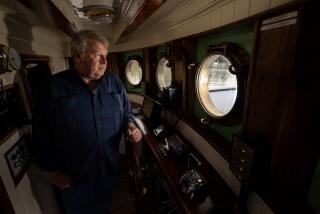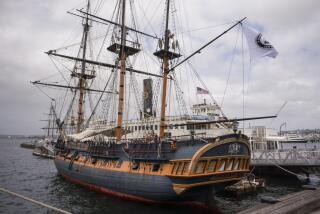Celebrating a Columbus of our dreams
- Share via
There are those who say that no 16-year-old should be allowed by his parents to challenge the storms and the loneliness of the sea by himself.
An adolescent, they insist, isn’t emotionally prepared to face the terrible emptiness of the ocean, where the mind turns in on itself during nights as black as the Devil’s heart; where the wind whispers words the ears can never quite hear.
They warn, these timid ones, of the gales that howl through the riggings and the rogue waves that can overturn a tanker. They tremble at the very notion of a boy, hardly a man, who sets a course for the far reaches of his imagination in a very small boat on a very big ocean.
And so they turned away when Zac Sunderland sailed off in his fiberglass sailboat, a tiny slip of humanity on the expanse of the mighty Pacific, determined to be the youngest person ever to sail around the world alone. They were afraid to think the thoughts that emerged from their sense of doom.
I’m not among them.
We are all dreamers in our own way, but it falls mainly to the young to shape visions into reality despite the misgivings of doubters who caution prudence over determination on the way to a goal.
There are different kinds of oceans in life and each contains its own set of dangers. High waves and deep troughs imperil the route to ambition, but the will to succeed is a force to be reckoned with.
A fifth-grade teacher who had stirred the writer’s dream in me offered these words: “But the reach must exceed the grasp else what’s a heaven for?” That quote from Robert Browning defined the thrust of my life and in its own way the quest of the boy Sunderland who reaches over the deep blue sea.
Zac’s parents, who support his quest, have pointed out that his first home was a boat and that sailing has filled his life. Zac himself says he began thinking about circumnavigating the globe when he was 8, and has never thought he wouldn’t do it.
He really had no choice. Once the dream was born it became a part of his physiology, and his life became a pattern of options that led to the day he departed Marine del Rey aboard the 36-foot Intrepid. There were hurrahs, hallelujahs and the honking of boat horns, and perhaps a few silent prayers that the adventure would not end badly, a child of destiny lost in darkness.
It was when the chase boats turned back that both the boy and his parents realized that this was it, the journey had begun; he was alone on a sea of reality.
In an e-mail from Zac sent through his mother, Marianne, he admitted to me that the loneliness had set in almost instantly. “At first I was very in the moment, then when everyone turned back there was an overwhelming sense of emotion, leaving my family and crew . . . the responsibility of the entire boat and passage, and then the thought of being alone. It was powerful.”
With that awareness of his isolation, Zac wrote, also lay the knowledge of what he had undertaken. “I am still excited to get where I’m going but there is a greater realization of what it will take. It is very hard work trimming the sails with the changing winds, fiddling with the wind vane, the hyper-vigilance of monitoring the condition of the boat, instruments and the weather. . . .”
The sea, as someone once remarked, is more truth than poetry, and the boy is experiencing in real time what he had only anticipated in theory: “No matter how many people explain the separation anxiety and the effects of lack of sleep on you, you can’t really understand it until you experience it.”
Does the ocean seem too vast for him, too endless? “No. Almost but not quite. I see myself getting more confident each day. I guess the farther I go, the stronger I’ll be.”
“When Zac sailed away,” his mother e-mailed me, “it was like a dream. I didn’t really think of what it would be like. I was really proud of him. I couldn’t believe it was my son!”
With notoriety came the carping of critics accusing the Sunderlands of abandoning Zac. His mother wrote: “It was awful when people judged me without knowing me and my family. . . . When all was said and done, we were still confident that we were right in supporting Zac’s efforts.”
I wondered, as I considered the boy and the sea, if I would have allowed my own son to undertake such a journey.
Of course.
Because I know and the Sunderlands know that humanity moves forward on the wisdom of its caretakers and the daring of its young. How else would our reach ever exceed our grasp?--
almtz13@aol.com


